Mickey Lin
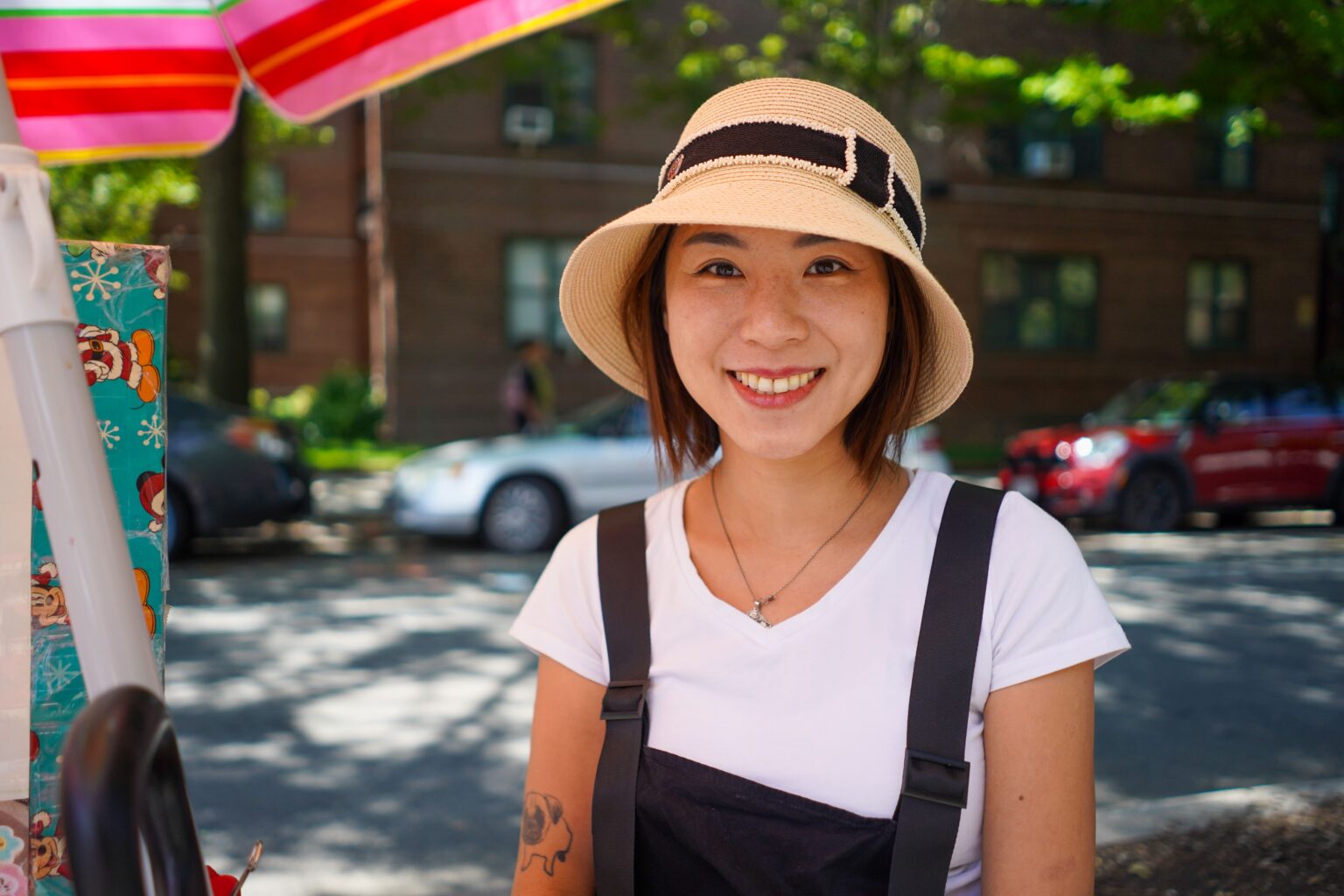
One Sunday in late August 2021, as New York was easing out of a heat wave and droves of people flocked to the Open Street to enjoy the cooler weather, Mickey Lin glided down the avenue pulling a red wagon stocked with her homemade treats: cookies, rice crackers, and cakes, all in packaging adorned with “Mickey Lin’s Messy Kitchen” stickers. She reached her usual spot on 34th Avenue and 79th Street, near the entrance to the Jackson Heights Greenmarket. She lifted her wagon onto the median, between the two lanes that used to be filled with cars and were now filled with joggers, people walking dogs, and shoppers streaming toward the farmers' market. Mickey’s husband and 23-month-old daughter would join her later, but for now she had time to herself. Vending on the Open Street offers an escape from the daily pressures of motherhood, from the apartment walls that confined her since the pandemic.
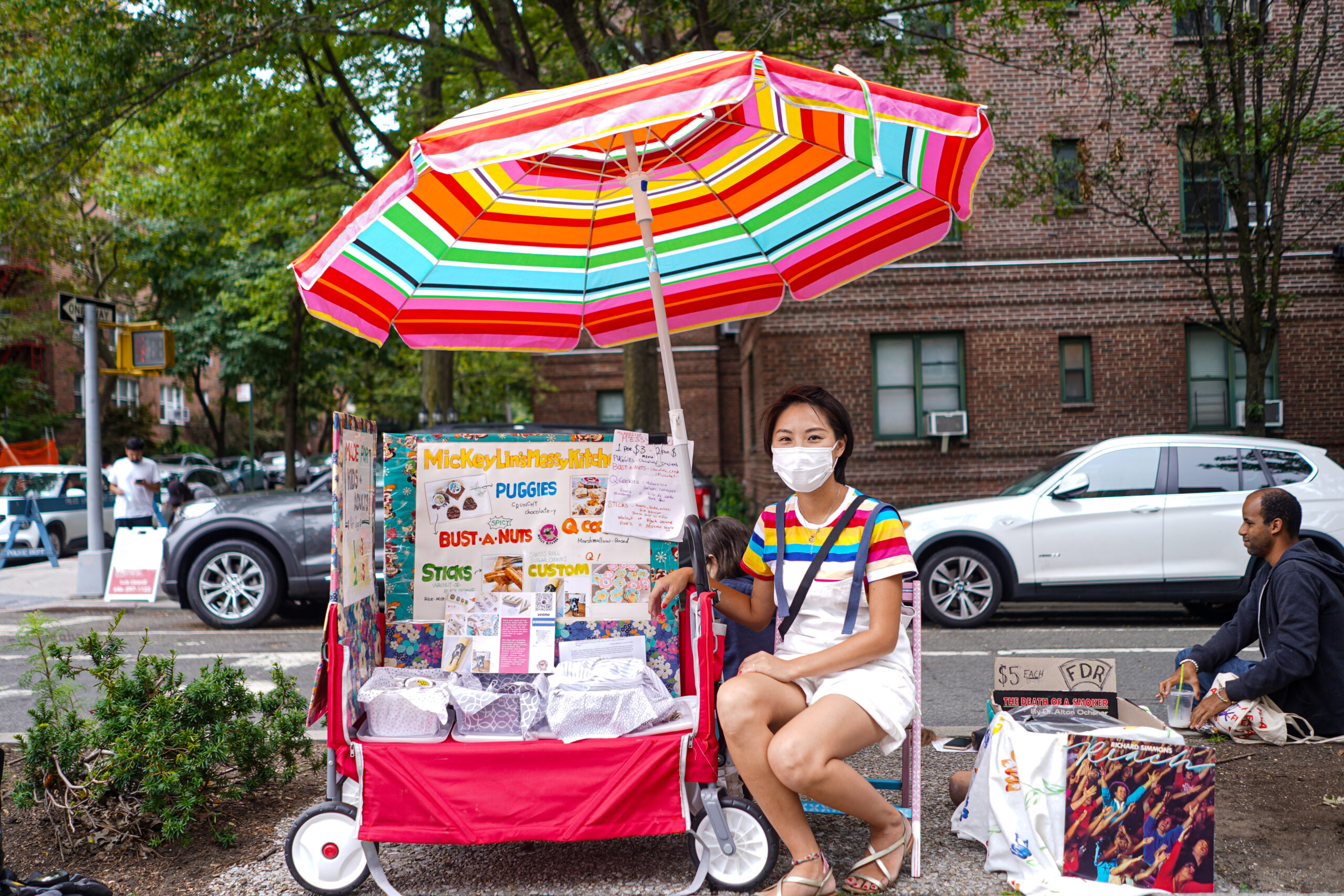
She set up her hand-painted pink and blue folding chair and, for protection from the sun, a rainbow striped umbrella that matched her colorful striped shirt. She arranged hand-drawn posters advertising her wares: healthy rice sticks, marshmallowy Q Cookies, spicy Bust-A-Nuts, and chocolatey Puggies, named after her favorite animal. She hung a sign listing ingredients in English and Spanish, and a laminated sign with photos of her custom cakes. Then she perched on her chair, surveyed the shoppers on the avenue with a smile, and called out, “Taiwanese snacks!”
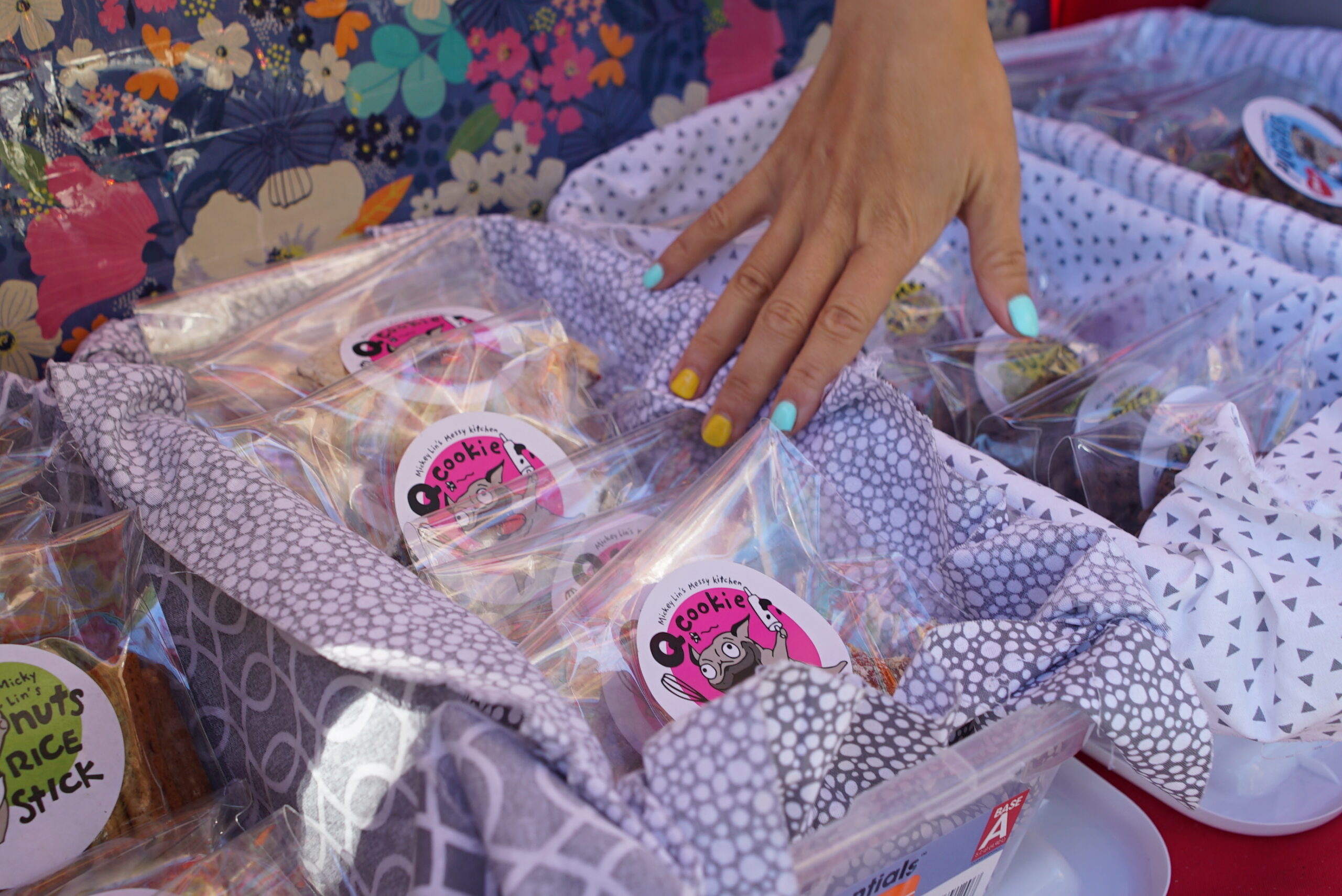
A woman approached and picked up a package of Q Cookies. “In Taiwan, ‘Q’ means ‘chewy’,” Mickey explained. “The chewiness comes from marshmallow.” This creation is inspired by a popular Taiwanese cookie with nougat and peanuts. Mickey makes a softer version, sweet and slightly salty, with delicate flaky layers.
Two children spotted her and ran over, their parents following closely behind.
“Last time we did the spicy ones,” the mother said, peering into the wagon.
“Oh, you got different flavors,” the father remarked. “This one’s strawberry. This one is pork floss.”
“What?” asked the mother.
“Pork floss.”
“What’s that like?” they turned to Mickey.
“In Taiwan, we cook pork a long, long time.” Mickey searched for words to describe the finely shredded dried pork seasoned with soy sauce and sugar.
“OK, I’m gonna do a strawberry, and let’s try that pork.”
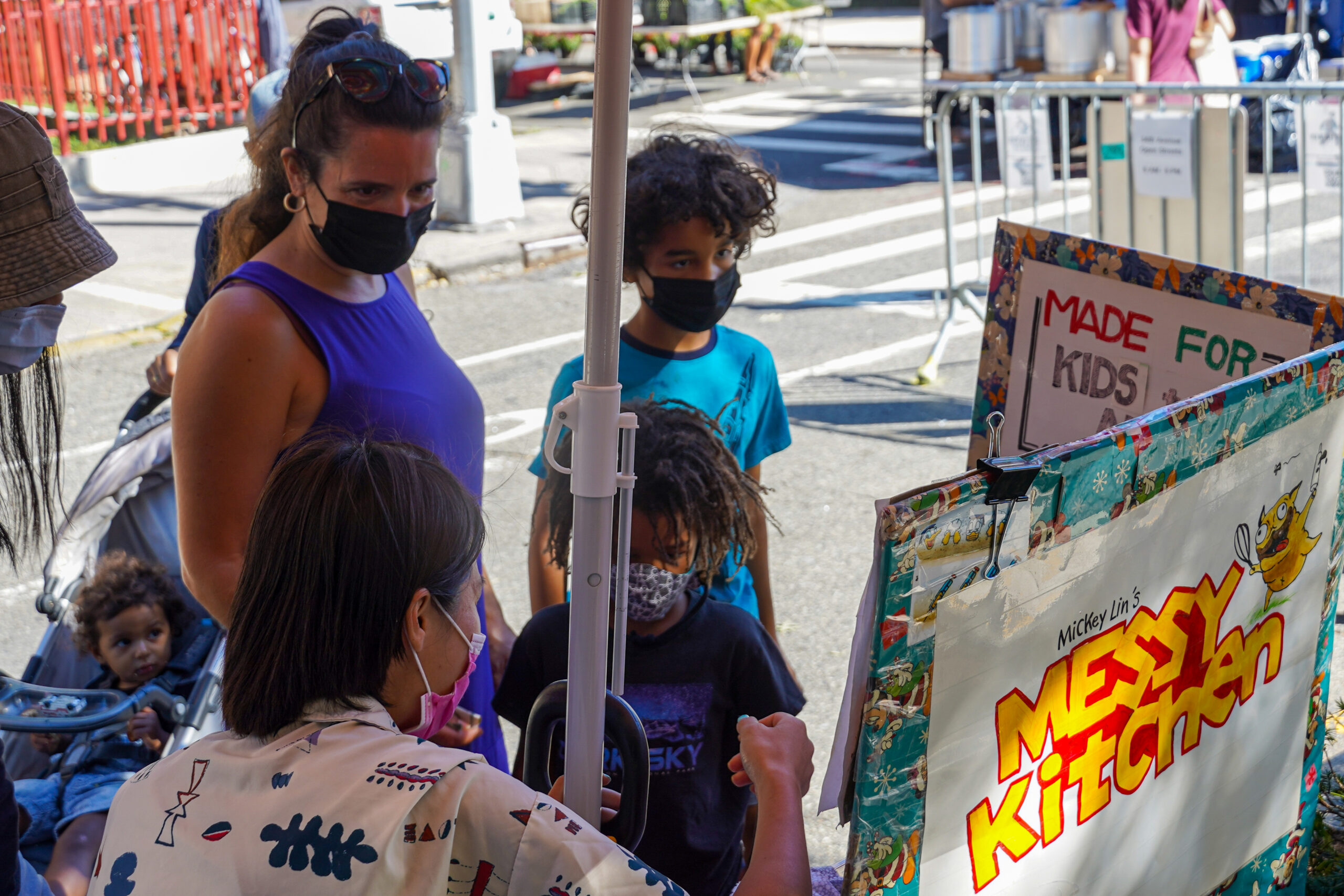
Two girls on skateboards stopped at her table. “Is this for dogs?”
“No, for humans!” Mickey pointed to a large sign reading “Made for Kids + Adults (Not Dogs).” She’d learned quickly that this was a necessary clarification; some people see the drawings of pugs on her logo and stickers and assume she’s selling upscale pet food.
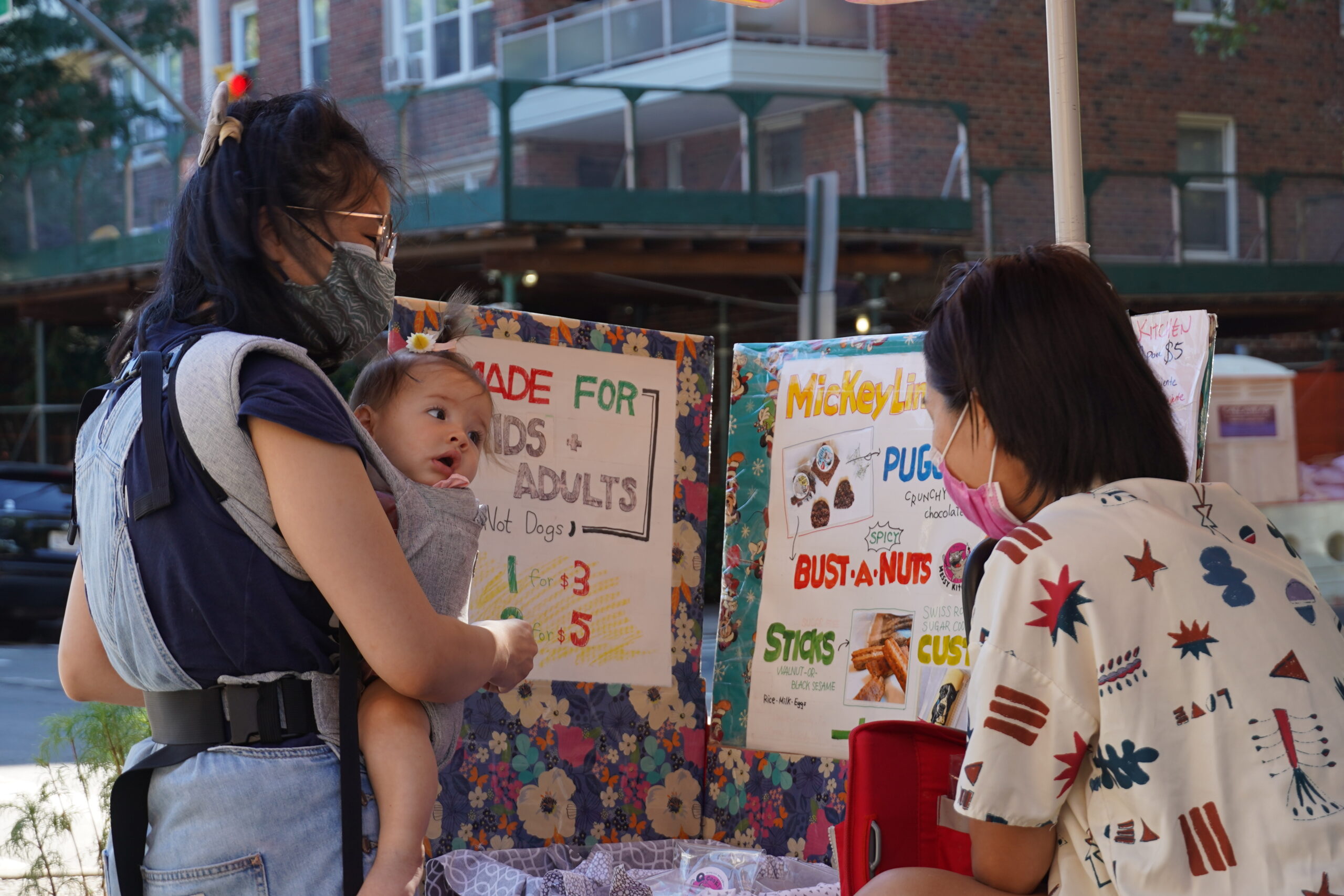
As she helped customers and called out to entice passersby, Mickey exuded a friendly, attentive energy, easily breaking into tinkling laughter. Most of the people who come to her station are regulars, many of them parents with young kids. Children abound in Jackson Heights, a longtime destination for immigrant families. Mickey lets first-time customers know that she takes orders for custom cakes, and encourages them to follow her on Instagram to see her edible artwork. She tells potential clients, “I can draw anything on a cake!”
Although Mickey has a permit for selling baked goods, she doesn’t sell inside the farmers' market to avoid stepping on the toes of the more established vendors there. Instead, she sets up her station around the corner on the Open Street. She’s not the only one who had this idea. To Mickey’s right, the Jackson Heights Immigrant Solidarity Network was tabling, handing out their newsletter and information sheets about their mission and members’ activities. To her left, Monica Quintero sold homemade Colombian coffee cookies and brownies. Later, an artist who goes by ET set up next to Monica to sell original prints of the city skyline. On the other side of 79th Street there was a free book giveaway, and free neck massages from Bodywork Spa Jackson Heights, a local business that regularly sets up a massage chair on the median. Greenmarket patrons with bags full of peaches, eggplants, knishes, and farm-fresh eggs stopped to look at their tables.
Mickey’s number one customer, Rita, dropped by. “My daughter is obsessed with the rice sticks,” Rita said. Mickey created the sugar-free rice sticks for her daughter, a picky eater. She uses walnut oil because it’s good for brain development, and black sesame because it’s rich in calcium. The result is a bland cracker that young kids go crazy for, and parents, like Rita, appreciate as a healthy on-the-go snack for their little ones.
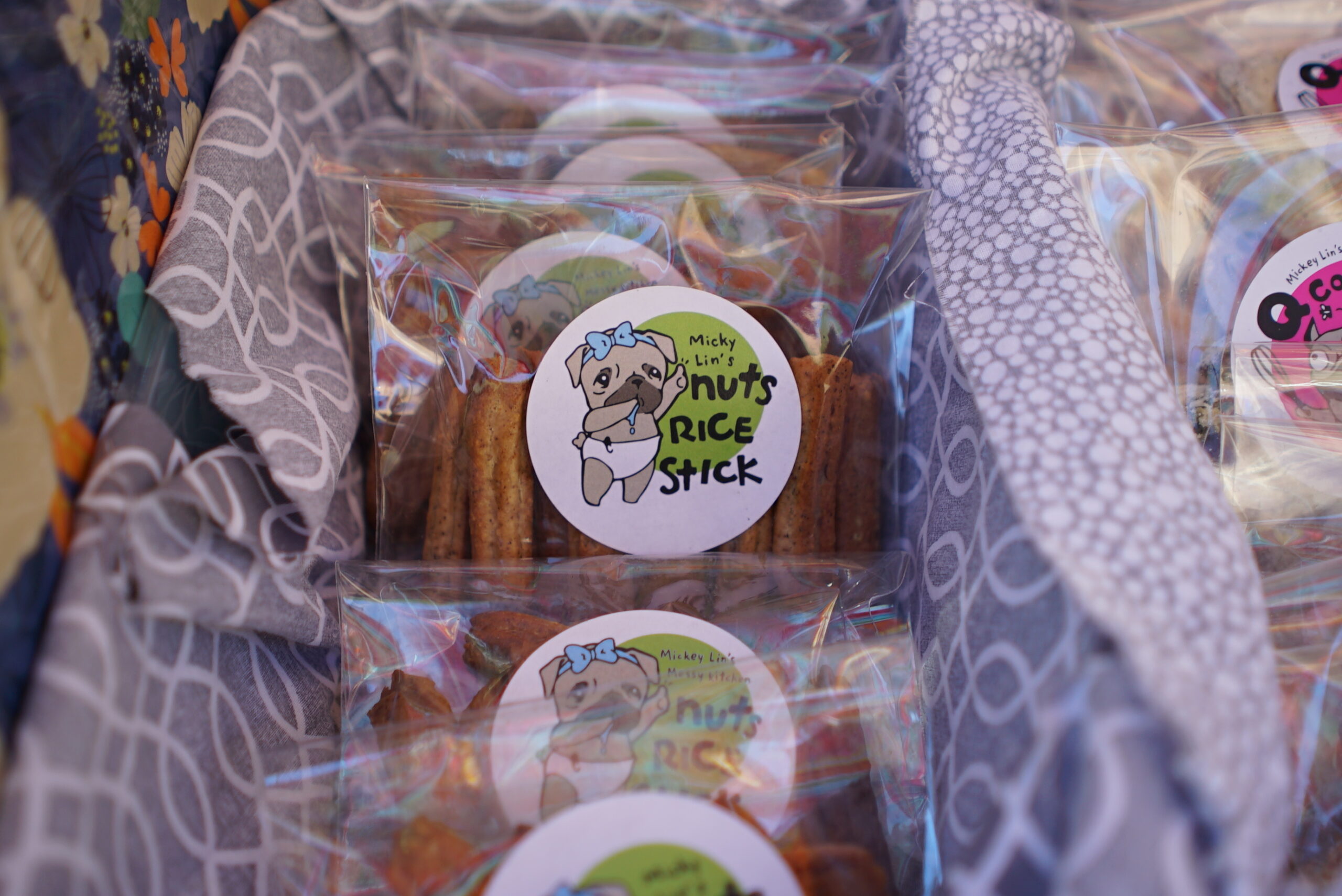
Rita found out about Mickey Lin’s Messy Kitchen when she saw a post of Mickey’s on a Jackson Heights Facebook group. It was when Mickey was just starting out, shortly after the March 16, 2021, shootings at spas in Atlanta that left six Asian women dead. Rita, who is Filipina American, was concerned by increasing incidents of anti-Asian hate crimes since the beginning of the COVID-19 pandemic, and energized by the AAPI community’s mobilization against racism. She felt especially eager to support an Asian woman entrepreneur.
“I’m curious and I like to eat,” said Rita. “I came out, tried her stuff, and they were good.” She commissioned Mickey to make a red bean cake for her mother’s birthday, then sugar cookies with a Raya The Last Dragon design for her daughter’s fourth birthday. A taro cake followed, then a lemon cake, and today she’d asked for mango. Mickey made a concoction with layers of mango agar pudding, heavy cream, and chiffon cake, topped with white chocolate icing. “Yesterday I kicked my husband and daughter out of the house. I need quiet time, so I can do invention,” Mickey told Rita. “With my daughter there I really can’t do anything.”
Mickey Lin’s Messy Kitchen is an outlet for creative expression, and Mickey is direct about her need for mental space to dream up new recipes and cake designs. She has always been artistic. She used to love painting, and briefly worked as a graphic designer, but didn’t like sitting in an office all day and answering to a boss. So, she became her own boss: for seven years, she ran a B&B in Toucheng, an idyllic beachside community. In Taiwan, B&Bs do more than serve breakfast; hosts often invite guests to join in their daily lives, and Taiwanese people often choose lodging based on the owner they want to stay with. Every morning, Mickey would prepare breakfast for her guests, and each evening barbeque on the beach, then they would drink and watch the sunset together. It felt like a family. “You can talk to so many strangers. It’s a lot of fun,” Mickey reminisced. She loved meeting new people, especially visitors from different countries.
One time, a guest from England informed Mickey that she was vegetarian. Mickey understood the meaning of the word “vegetarian,” but wasn’t familiar with the pronunciation, and accidentally called her a “virgin.” Later, when she realized her mistake, she was so embarrassed that she vowed to improve her English. Below, Mickey recounts her encounter with the vegetarian:
Click to Read Transcript
One day, a customer, a couple, they came to my place, and they were from England. And then the girl--because I asked her, What time do you want to eat your breakfast? And then she told me she was a vegetarian. And then, because my English was super poor, but I kind of knew what she said, but I didn't know how to pronounce it. So I just told her, "Don't worry, don't worry. I know how to cook breakfast for virgin." [Laughter]
She was so serious, looking at me, and I thought I was right. And then next day, because at the moment I had a friend from--he is American, and then he saw the couple came, so next morning he asked me, "Oh, how was that couple?" And then I told him, "Oh, they are nice. She is a virgin." And then my friend told me what happened. And after that, I always remember this word. And after that, I feel like I really need to learn something, I really need to learn more.
Mickey and a friend applied for student visas to study English abroad. Her friend, who was enamored with New York City, chose the location. But only Mickey got the visa. She came to New York alone. The city wasn’t as she’d imagined; from movies, she expected it would be fashionable and fancy, but compared to Taiwan it was dirty and technologically backwards. She booked a cheap AirBnB in Hunts Point in the Bronx, commuted to language school in Midtown Manhattan each day, and befriended other students in her class. Partly to meet locals, she joined OKCupid. That’s how she met Jeff Orlick.
Despite a rocky start (he teased her about a profile photo with a tiger, accusing her of complicity in animal abuse; she didn’t see the humor in it) they started dating and fell in love. Jeff is a longtime Jackson Heights resident, and Mickey visited him there, but didn’t find it an interesting neighborhood. She liked that there were so many trains nearby; it made it easy to get to Manhattan, where she preferred to spend her time.
She’d originally planned to stay three months and return to her B&B before the busy summer season, but for Jeff, she extended her stay to six months. She went back to Taiwan when her visa ended, but soon returned to New York. She moved into his apartment in Jackson Heights. They got married. Almost immediately, she got pregnant. She decided to close her B&B and stay in the US. She gave birth to their daughter Layla in September, 2019.
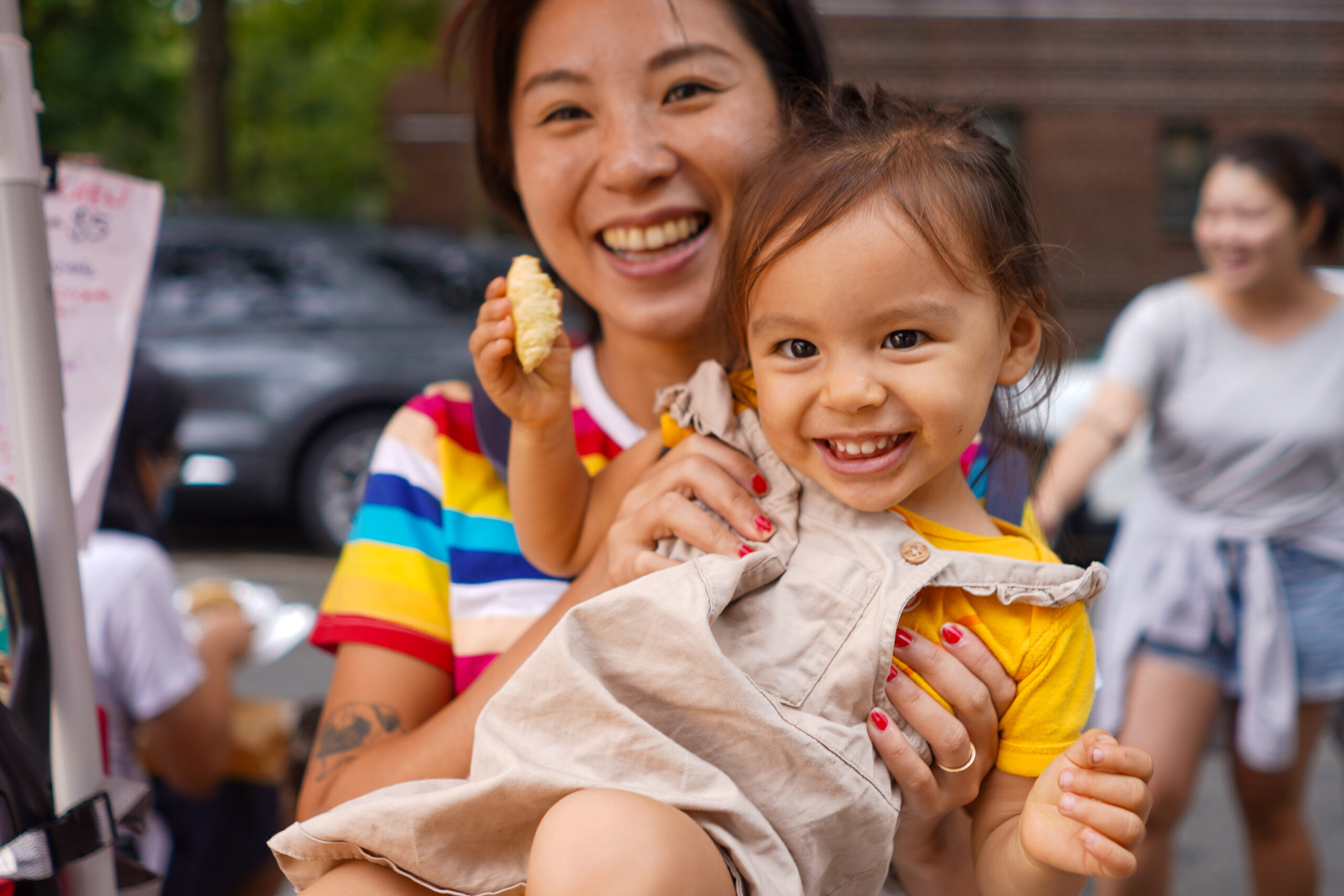
Soon after, she started hearing from family and friends in Taiwan about a deadly virus spreading in nearby China. It wasn’t long before it reached New York City, and Mickey found herself living in the epicenter. Now, news reached Taiwan about the dire conditions in Queens. Friends and old B&B guests messaged her asking if she needed them to send face masks.
For Mickey, the experience of motherhood and the pandemic are inextricably intertwined. She found herself quarantining with her husband and newborn baby, in this place she’d moved to for Jeff, but didn’t feel connected to. Most of the friends she’d made as a language student had returned to their home countries; now, she couldn’t meet new friends.
For months, Mickey and Jeff barely left their apartment, afraid of exposing Layla to the outside world. In the beginning of the lockdown, they carefully limited how much they went out to the supermarkets that remained open. They survived on a huge turducken that Jeff had bought and stored in their freezer.
In this interview excerpt, Jeff and Mickey remember the turducken that got them through the pandemic:
Click to Read Transcript
Jeff: We bought this turducken, or I already had it.
Mickey: We had it left when my sister was here before the pandemic, and then he bought--
Jeff: I bought this huge turducken.
Mickey: Huge! And I thought he was crazy, who is going to eat that? And then it turned out, it helped us to survive the pandemic [laughs].
Jeff: Yeah. So for a whole month we ate the turducken [laughter]. It was like a miracle, because we couldn't go out. We didn't go out. You couldn't go out for groceries.
Mickey: Yeah. And they were all closed for a long time.
Jeff: Yeah, and those huge lines. Crazy. So that turducken saved us.
Mickey: It was in the freezer for many months.
Jeff: I was waiting for a special occasion. But in New York City, you rarely have 20 people over for dinner [laughter]. So the special occasion never came. So, we started chopping it up. She made like the most awesome dumplings.
Mickey: Bao.
Jeff: Bao. A bun with stuff in it. It was so good, from the turducken. It was awesome.
Mickey and Jeff busied themselves taking care of their infant, and felt lucky to have time together as a family in those early months. “Even without the pandemic, I couldn’t go out at all,” Mickey said; she was completely absorbed in motherly duties.
The creation of Mickey Lin’s Messy Kitchen wasn’t motivated by financial concerns, but by the need to get out of the house, to break the isolation and monotony that was beginning to crush Mickey. “During the pandemic I was so bored,” she recalled. She hadn’t baked before, but when supermarkets reopened and covid cases started going down, she was excited to buy groceries and try new things. She learned about baking from YouTube videos. “And then one day I made a chocolate crunchy cookie, and my husband loved it so much,” said Mickey. “He said I definitely need to sell this, and that it would be super popular.”
Jeff had experience leading food tours, and when he bit into that cookie, he realized it not only tasted good and was simple to make, but had a key element that would make it a success: the magic combination of exotic and familiar. Hear Mickey and Jeff describe the invention of the first cookie, and how they named Mickey’s creations:
Click to Read Transcript
Mickey: And then one day I made a chocolate crunchy cookie, and then my husband loved it so much. And then he said, I definitely, definitely need to sell this, and that it would be super popular. So it was the beginning.
Jeff: Yeah, I tried her cookie and it did taste good, but tasting good is--not saying it's easy, but it's common. A lot of things taste good. But this particular cookie is very easy to make.
Mickey: Yeah, it’s very simple.
Jeff: Yeah, you could make a lot of it at the same time. So I just thought it was a perfect food to sell on the street. I find that the combination of exotic and familiar is like the magic combination. So, this cookie is exotic: Taiwanese, it's from this island country in conflict with China, all the way on exactly the opposite of the world. But it's also just a chocolate crunchy cookie. Like, it's something that Americans would totally be relatable.
So, it's exotic and familiar, and it's easy to make, and she would be great, she's so friendly, everybody likes her, and she has a good aesthetic also. So, that’s why I thought she would be perfect to do street vending. And I always wanted to do it, too. So, we started.
Mickey: Okay, so, we tried so many different ingredients, we tried so many different chocolate, how to make it better. And then, because we can not just only have one product. And so we try to make a "Q cookie," and then he loves it. And we were thinking about how can we name our chocolate cookie? And then he said, "Oh, Bust A Nut."
And then, because I didn't know what it means. And then he told me the real meaning, and I was shocked, and I say, "No, this chocolate cookie should be good for kids." And I don't want baby know this word and say this word on the street. So I just told him, like, maybe we could have a something different flavor and fits this name. He want to use this name so badly. So I came up the idea, maybe we could make a spicy one, call it Bust A Nut.
Jeff: Make a spicy one, have that be named Bust A Nut.
Mickey: Yeah, because for your--
Jeff: Because it's such a good name. And I thought it would go crazy. I thought all these teenagers would want to get it after school [laughs] because they always say it. I thought it would go viral.
Mickey: Actually, it's not [laughs].
Jeff: Yeah, actually, it's like the least seller [laughter]. So, turns out I can only sell it to 40-year-old men, like immature 40-year-old men like myself [laughter].
But we rounded it out with the other cookies. So we made the spicy one "Bust A Nut," the regular chocolate "Puggy." My mom came up with that name because it's cute, and she loves pugs. And then she made the "Q cookie."
Mickey: It turns out Q cookie is the most popular one.
Mickey experimented with different ingredients and perfected her recipes. On a chilly day in late March 2021, she ventured out with 12 cookies, one Swiss roll cake, and her daughter’s small plastic table. Curious passersby stopped to see what was on her table. The first two days she sold most of her treats, but gradually interest seemed to wane.
Then Jeff made signs. They got the red wagon, and Mickey decorated it. Step by step, things came together. Mickey made better signs, drawing on her background in graphic design. A friend designed a logo and stickers with drawings of pugs. She tried setting up in different locations on the Open Street on different days. By the summer, she was making 30 bags of cookies for the farmers' market and selling out.
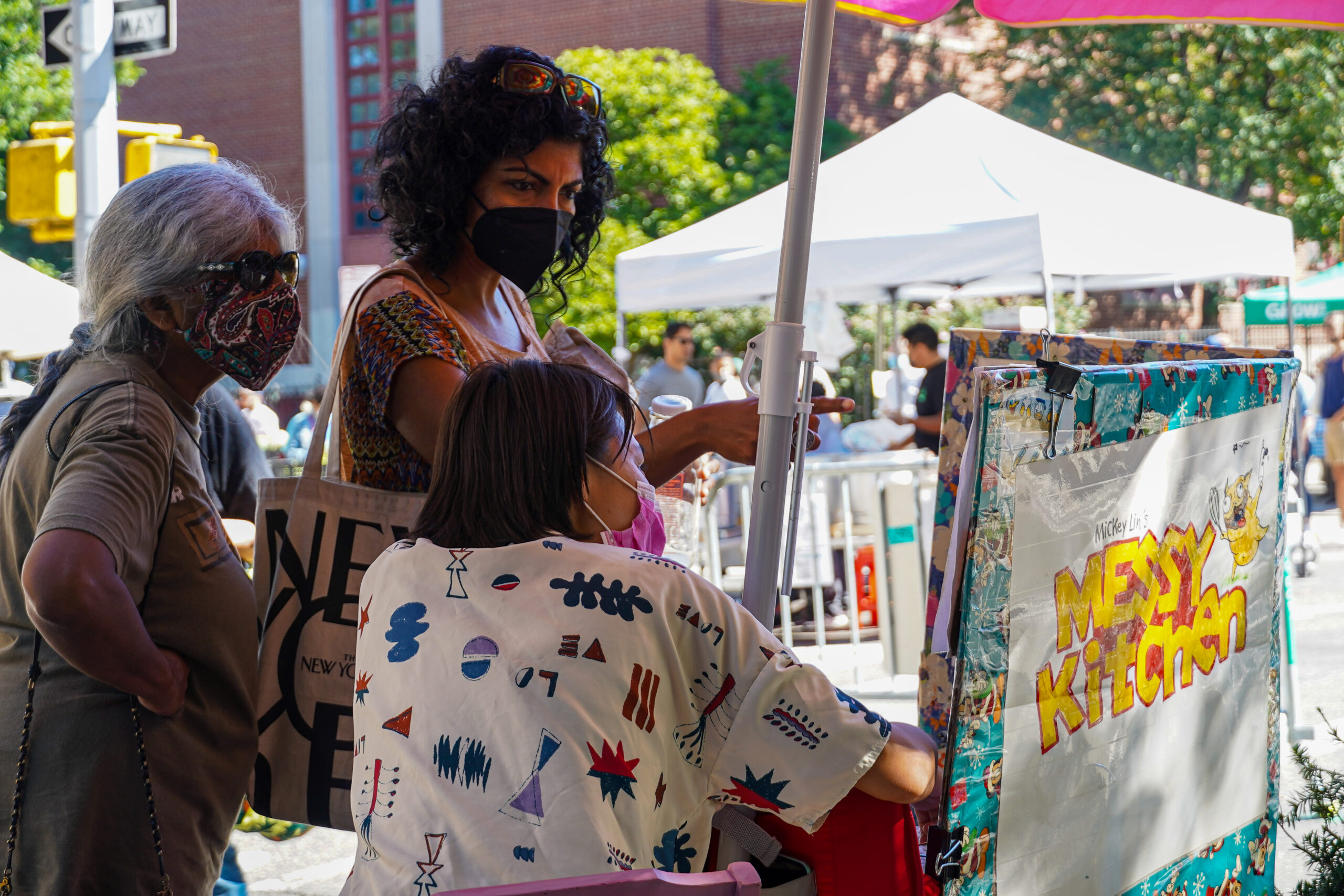
This late August Sunday, she only had a few Bust A Nut cookies left when Jeff came by with Layla. Layla teetered over to her mother, helped give cookies to a customer, then held up her hands to Mickey. Mickey stood, picked her up, and spun her around, exclaiming, “Woo! Yay!” Layla squealed in delight.
Mickey’s friends Lianne and Jack stopped by with tostadas from a Mexican food stand in the Greenmarket, and sat on the median next to Mickey’s cart as they ate. “This is my Sunday ritual,” said Lianne. “We come for breakfast, and to hang out with Mickey.” While chatting, Mickey sat in her chair and played with Layla, who began picking up debris from between the cement cracks in the median and putting it on Mickey’s lap. “On Open Streets it's like a meeting place. Some friends come over, then we see some other friends jogging, and all of a sudden we have like six of us,” said Jeff. “We all gather in front of her selling station.”
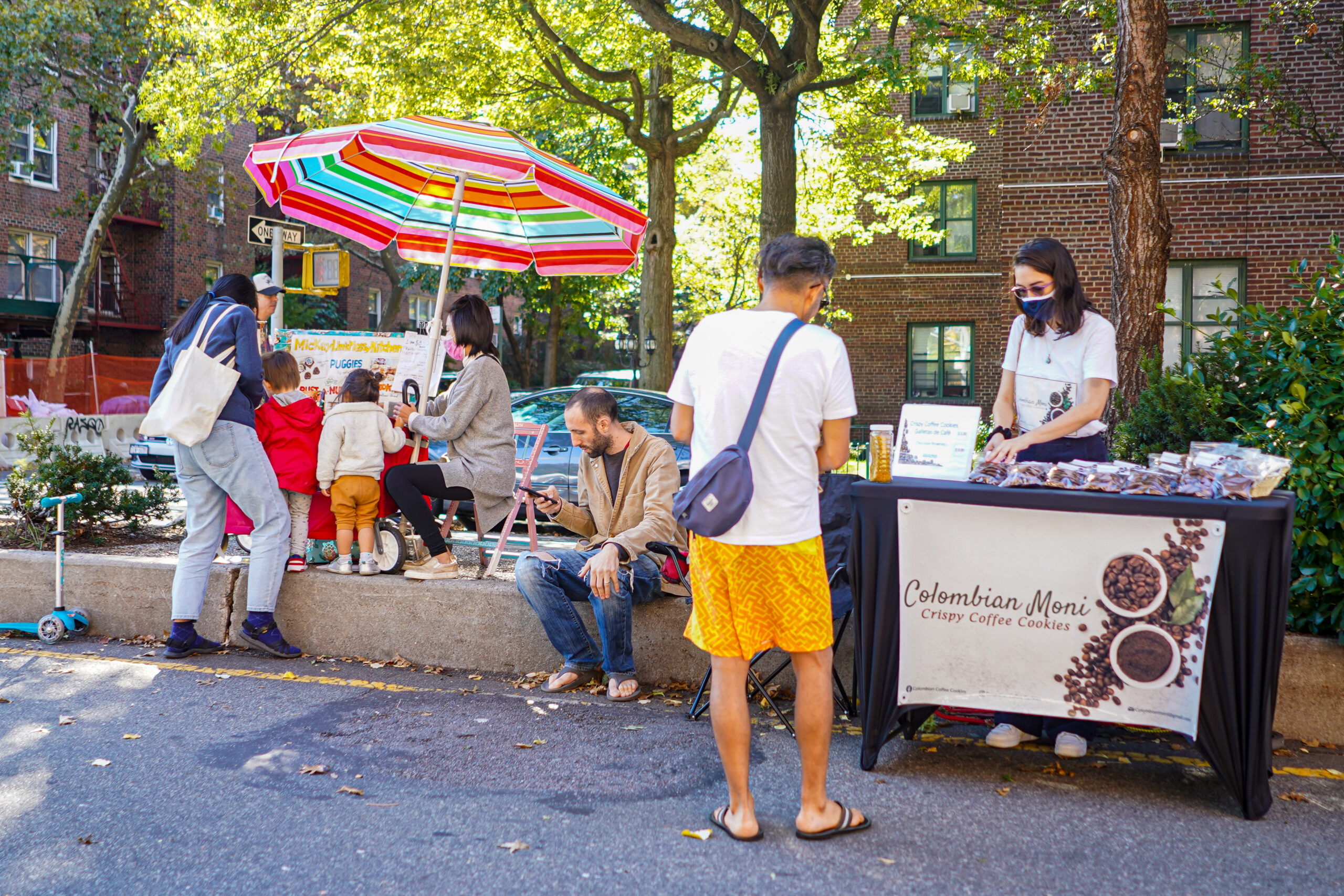
Before 34th Avenue became an Open Street, Mickey didn’t even know where 34th Avenue was, although she lives just a block and a half away. Jackson Heights was a place she commuted away from, and returned to sleep. It wasn’t a place for hanging out and having fun. “It was just cars and buildings,” Mickey said. “Before the Open Street, I really didn’t care about the neighborhood, it’s all the same. I didn’t go out. I didn’t walk around. I had no friends here.”
She lives on 73rd Street, and describes it as dirty and loud, with near-constant honking. “When I was going to sell cookies, I found out this area, and I realized it’s beautiful here.” The Open Street opened up the neighborhood and changed Mickey’s perception of her home. She used to feel intimidated by language barriers, but vending pushed her to talk to people, and she became more comfortable. “The Open Street is really important. For me, it’s like Central Park in Manhattan.”
Here, Mickey describes how her feelings about Jackson Heights have changed:
Click to Read Transcript
So actually I started going out after the pandemic, when I selling the cookies. So before that I kind of never go to 34th Avenue or anywhere. I just only stay in my place. I wasn't comfortable at all talking with other people. Before that, I really, I [was] even afraid of going to restaurants, order food, because I didn't know how to order foods, or English.
After having the Open Street, I feel like here is much more interesting, because before that, for me, every road, just everywhere, [it was] just streets and cars. So I didn't want to go out, because it wasn't fun at all. It was just cars and buildings.
Now, I really like here because is so many family here, and then the school, especially the schools, it seems like they are [more] excellent than other place. So I think here is a good place for kids, for my daughter's education, or hang out with people, because the people here is all from different countries, and I think that's good.
And especially, I really feel that Open Street is super important for us. Then I could have a chance selling food and then also practicing my English with strangers. I mean, this Open Street is kind of change my lifestyle, too. Like, I really want to go out more in this neighborhood. I feel before it [was] just a place for living. I mean, just car, building everywhere. So it doesn't matter if I live in Jackson Heights or the Bronx. For me, just all the same.
And now, I feel like a little bit like I live in a suburban. I mean, I have some place I can walk around, like the tree and a breeze. It's wonderful. And then kids can hang out. So I think, then we don't really need to buy a house, have a back yard, because we have Open Street.
Since creating Mickey Lin’s Messy Kitchen, she’s been able to meet new people, like she used to when she ran a B&B, and practice English with customers. She’s also connected with Taiwanese people who saw her “Homemade Taiwanese Snacks” sign and stopped to talk to her. She estimates she’s met around 20 Taiwanese neighbors, many of whom are mothers, like her. She formed a group for moms who want to teach their children Mandarin.
Besides helping her connect with neighbors, vending on 34th Avenue also affords alone time that is so elusive for new parents. While Sundays are for socializing, on quieter weekdays she has a chance to sit with her thoughts, reflect, and plan for the future.
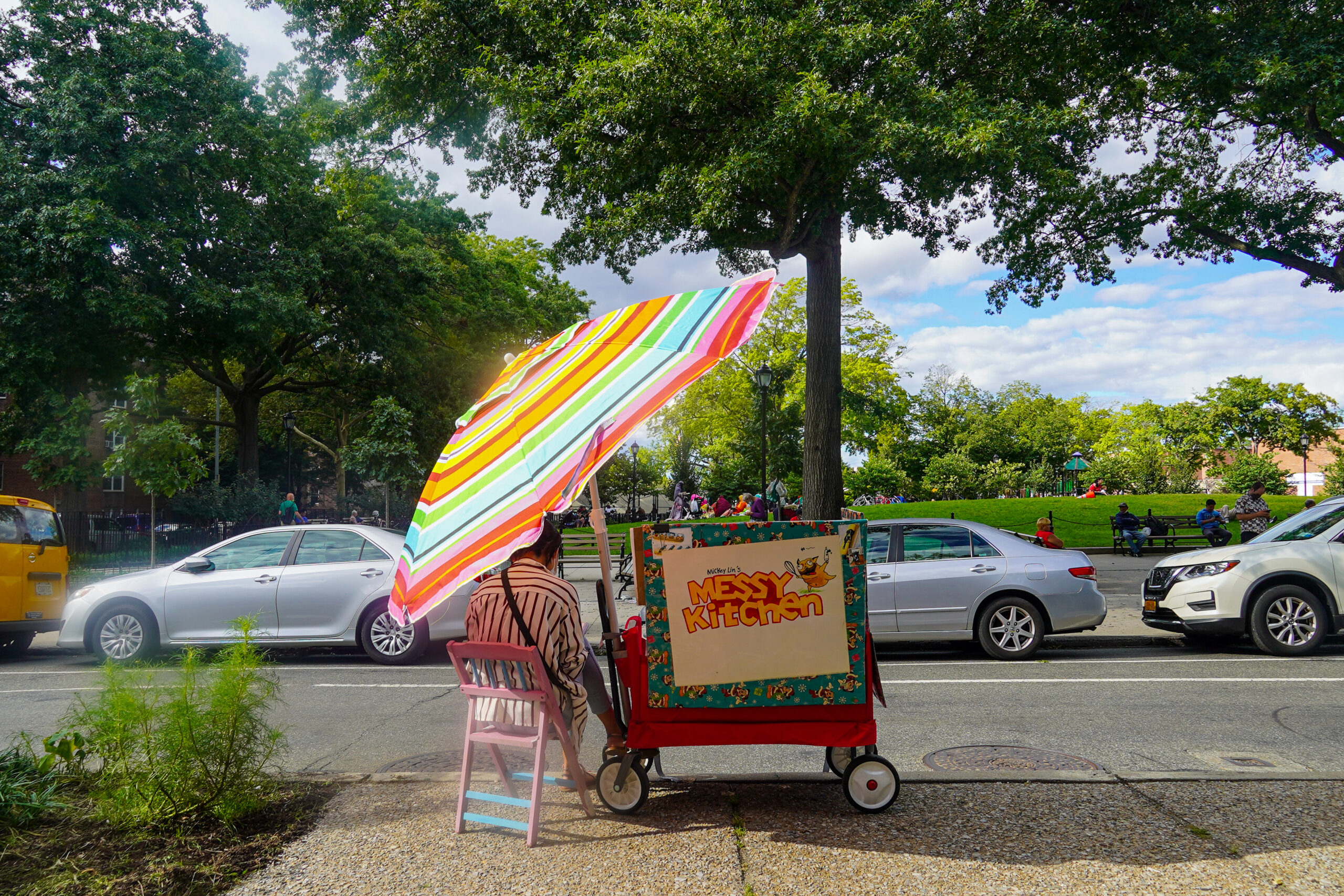
On Friday, September 3rd, Mickey set up her station on the Open Street in front of Travers Park. At the farmers' market, lines sometimes form at her station, but on weekdays by Travers, Mickey is usually alone. She sat in her painted chair, wrapped her arms around the umbrella pole, and leaned her head against it. “Today I came to relax, not really for selling,” she said. She took out a well-worn notebook and wrote down recipe ideas. She sketches designs for custom cake orders in this book. “I can not relax at home. My daughter always comes to me. She wants me to play.”
Most days, Mickey, Jeff, and Layla are home together all day. As a freelance TV news producer, Jeff often works nights, and usually goes to sleep around 7pm with Layla, then wakes up in the wee hours of the morning and heads to work. Mickey stays up at night after Jeff and Layla have gone to bed; it’s her time to experiment with baking. Neither Mickey nor Jeff sleep much.
“I need a break from my husband and daughter, to have my own time to think about everything,” said Mickey. “I think about my future. Like, I don’t know what I should do in my future. A lot of Taiwanese came here with high expectations for a good job. I came for marriage. I never thought one day I’d be here. I don’t know what I can do here for my career.”
She likes being her own boss again, being creative, working not just for money but doing something she enjoys. For now, she puts a lot of time into baking and doesn’t make much money in return. She and Jeff think of this period as an investment–she’s establishing herself, doing market research, testing recipes and locations for vending–and hope it will become a bigger source of income in the future. Mickey feels she still has a lot to learn and doesn’t know if she’d ever be able to make a living from baking. She fantasizes about opening a new B&B.
A man jogged by and Mickey called out, “Hi! Taiwanese cookies!”
He kept running.
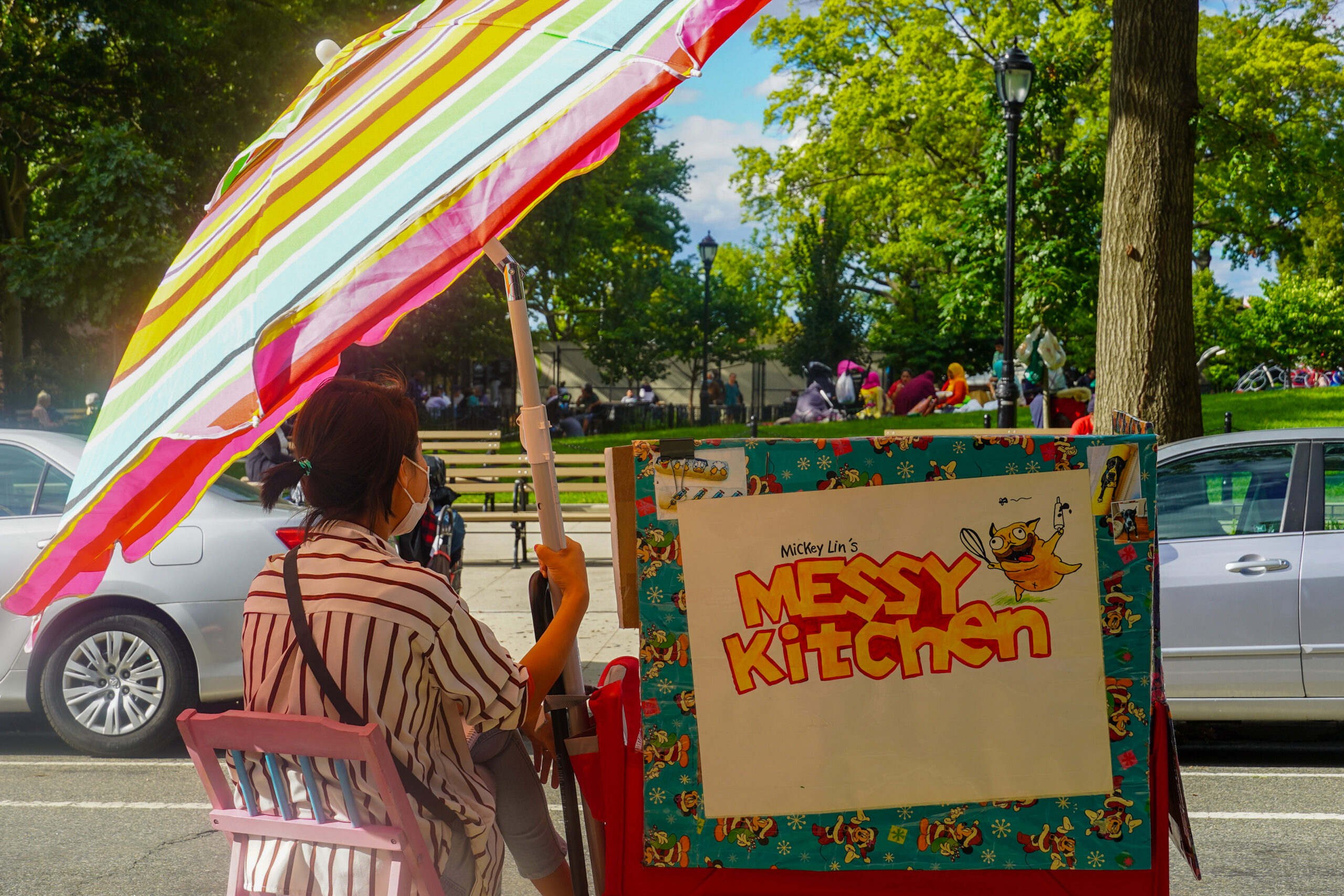
Across the street, people sat on benches that used to face traffic and now face the promenade of the Open Street. On the grassy knoll behind the benches, a family sat on blankets having a picnic, a shirtless man lounged in a beach chair soaking in the sun, and kids gobbled ice cream from the nearby truck.
A friend, Eugenia, stopped by with her husband and daughter. She’s one of the Taiwanese people who met Mickey on 34th Avenue, and part of the mom group that Mickey formed. “I don’t know if it would’ve happened without the Open Street,” Eugenia said. “We’ve gotten to know our neighbors better. It’s such a lifeline for us.”
She spoke to Mickey in Mandarin, bought two Bust A Nuts, two Puggies, and two rice sticks. As she departed, Eugenia asked Mickey how long she was going to stay out. “Till my husband and daughter go to sleep!” Mickey laughed.
Published June 2022